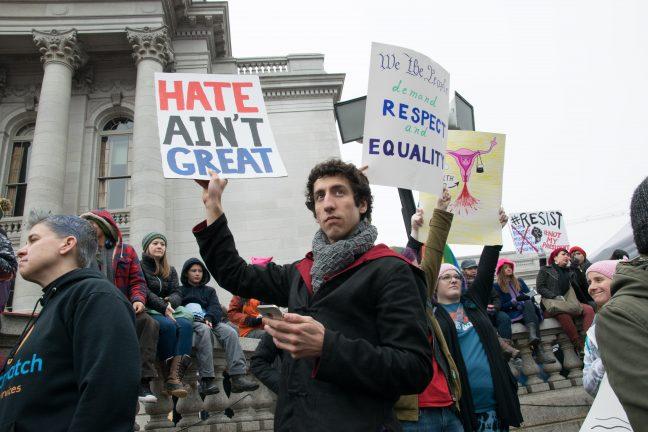When Kayde Langer, a junior at the University of Wisconsin-Eau Claire, left her dorm room Sunday morning, she was surprised by a note filled with a racially charged, and notably specific message.
The note read, “Go back to the rez red [N-word].”
Initial reactions and support for Langer — who identifies herself as Red Lake Ojibwe and is the vice president of UW-Eau Claires’s Inter-Tribal Student Council — appeared quickly after she posted a picture of the message, written in poor handwriting, on her Twitter page.
UW-Eau Claire Chancellor James Schmidt reacted in a timely manner and urgently condemned the act as unacceptable. He then ordered a formal investigation of the situation to be conducted by the Dean of Students, LaRue Pierce.
Schmidt did as a head administrator should when faced with a situation where somebody acted out of the establishment’s code of conduct — remove the institution from the perpetrator and indicate that their character is not representative of the school. As of now, the investigation has not concluded and no suspects have been identified.
That is, other than Langer herself.
While the investigation remains active, multiple speculative reports have surfaced claiming that the entire situation was a hoax, most notably from conservative talk show host Dan O’Donnell. O’Donnell delivered his take with purported evidence, including handwriting comparisons, the seemingly coincidental posting of a PayPal link for money the day prior, and the subsequent deletion of her Twitter account. Without any definitive proof or confession by either Langer or another student, however, it is impossible to say who was responsible for this heinous act.
What we can be certain of in light of this situation, however, is that the first amendment simply cannot catch a break. Once again, the freedoms afforded to us by the Constitution — the literal fabric of our democratic republic — have been used for harm.
Misuse of free speech is especially salient to those who wish to take it away from us — the very people we fight against benefit from ignorance as blatant as this. The popular rationale for these types of events is the American educational style. At a certain point, though, blaming our faltering education system for fostering this type of behavior just will not cut it. As a society we have fallen in love with deflecting blame upon structure, deferring our internal, definitively personal issues to the systemic nature of whatever it is that inconveniences us.
Instead of continuing to point our fingers at the school system, the time has come for an accountability reformation. A nation built upon the precedent that every individual is to be held responsible for their decisions means that the freedoms they enjoy are innately protected, for there will be nobody to challenge them.
What prevents this from happening? A distinct lack of interpersonal respect.
America has found itself embroiled in a morality crisis. As the country becomes more secular by the day, a number of citizens who decades ago would have acted according to their holy texts now believe they can behave however they please, free of consequences. This is not to say secularism is a bad thing — many countries are almost entirely without faith and manage to be a collectively happy, responsible people.
Again, the beliefs we have are not the issue. It is how we, on a personal level, perceive these ideals that makes all the difference. An American citizen who abuses his or her freedoms, such as the culprit of the racial message on the dorm room door, prevents us from reaching our true potential as a republic and contributes to the degradation of respect in our communities.
I believe every phenomenon at play here is connected through psychological tendencies that the American people frequently exhibit. The effects of mob mentality, or, more relevantly, collective apathy, explain how the better part of 330 million people have let our culture erode like rocks in a river bed.
We live in a nation where we ask for the bare minimum, adhere to it at our convenience, and are content with suffering the consequences of our lackluster effort. Society has informed us that taking pride in everything we do, from academics to simply respecting those around us in a collegiate setting, is not required anymore. That presents a difficult psychological barrier to overcome, so most of us just choose to abstain from change.
Regardless of who decided to write a racial slur on Kayde Langer’s avocado decoration, the necessary takeaways remain consistent. Instead of deflecting our problems towards the education system, everyone should look in their proverbial mirror and take responsibility for why it struggles to succeed. Instead of promoting censorship and blaming the first amendment for the terrible things that the uneducated spout, we should isolate those without credibility and make them aware of it.
To prevent racially hateful sentiment, we as a people need to hold those who produce it accountable for their decision, and make it explicitly clear that its unacceptable.
Justin Lariviere (jlariviere@wisc.edu) is a freshman studying communications and economics.


